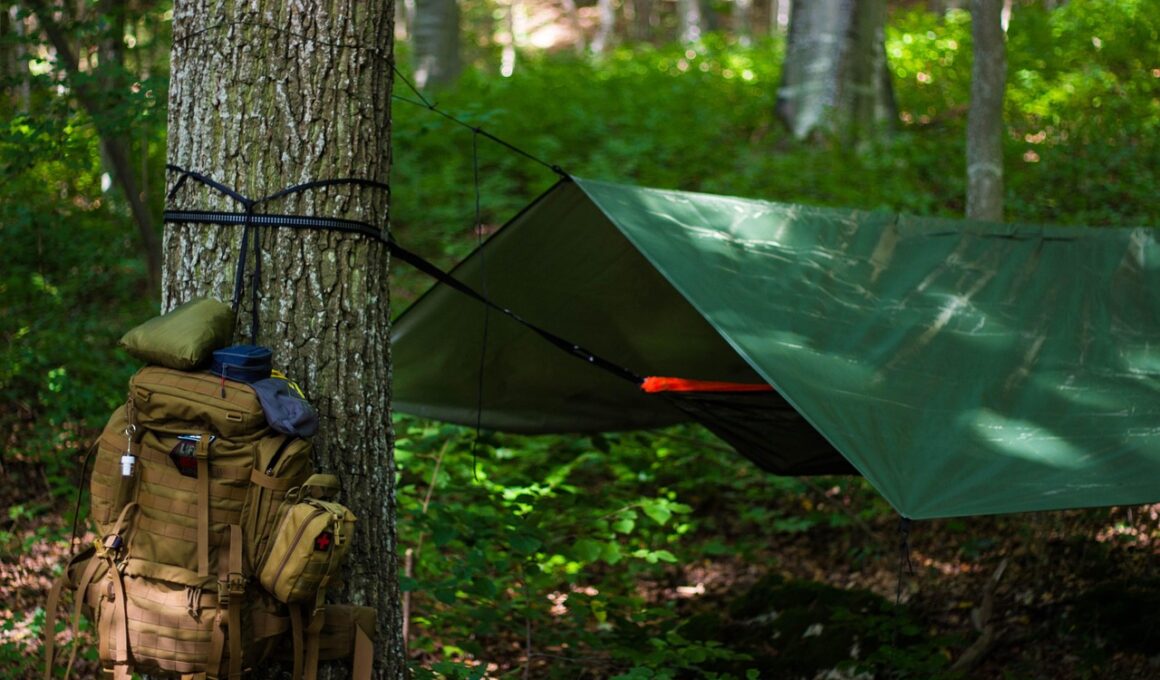Mental Preparedness for Challenging Bushcraft Experiences
Mental preparedness is a cornerstone for engaging in challenging bushcraft experiences. When venturing into the wilderness, your mind must be as resilient as your body. Adequate mental preparation can make a significant difference between enjoying your time outdoors and facing unforeseen difficulties. First, understand the environment you are entering. Research its wildlife, terrain, and weather conditions to reduce anxiety and increase confidence. Next, practice mindfulness techniques. These can help manage stress and foster a positive mindset. Deep breathing, visualization, and meditation can aid in staying calm during unexpected challenges. Also, set clear objectives for each bushcraft trip. Specific goals provide focus and motivation, helping you make decisions quickly. Remember, while physical skills are essential, mental clarity allows for better problem-solving in tight situations. Create a checklist of what to bring and tasks to undertake, as preparation minimizes uncertainty. Additionally, don’t forget about the importance of a support network. Engaging with fellow bushcrafters can offer emotional encouragement and shared experiences to learn from. By developing your mental skills through preparation, your bushcraft experiences will not only be challenging but also fulfilling and unforgettable.
The Importance of Adapting Mindsets
Adapting your mindset is crucial when facing the unpredictable aspects of bushcraft. Nature is inherently unpredictable, and each outing may require a shift in perspective. Cultivating resilience involves embracing the unexpected challenges that can arise. Rather than seeing setbacks as failures, frame them as opportunities for growth and learning. Understanding that discomfort is a part of the experience will help you acclimatize. Create affirmative thoughts to replace self-doubt and anxiety during bushcraft setups. Instead of thinking, “This is too hard,” reinforce your belief that you can handle any situation that arises. Create affirmations that resonate with you; write them down if needed. Surround yourself with positive reinforcement through literature, documentaries, or discussions about bushcraft. Also, consider journaling your experiences, detailing challenges encountered and conquered, as this helps in processing experiences and enhancing overall resilience. Discuss the benefits of adapting to the environment rather than forcing it to conform to your expectations. This adaptability not only improves your bushcraft skills but also empowers you to approach life’s challenges with resilience and creativity.
Another vital component of mental preparedness is developing situational awareness. This skill plays a crucial role in ensuring safety and effective decision-making in bushcraft settings. By enhancing your awareness, you can anticipate dangers and identify opportunities for problem-solving. Practice being mindful of your surroundings, taking note of changes in weather conditions, wildlife behavior, and signals from fellow adventurers. Engaging your five senses can provide valuable information in unfamiliar terrains. Additionally, learn to assess risks effectively by breaking them down into manageable steps. Identify potential hazards and determine ways to mitigate those risks. Familiarize yourself with navigation skills, understanding how to read maps and utilize compasses, which can instill confidence in orienting yourself during treks. Also, consider participating in workshops or training sessions focused on safety and emergency responses. Knowing first aid techniques and survival strategies can transform anxiety into enhanced readiness. Embrace a proactive attitude, recognizing that preparation is a continuous journey. Answering questions like, “What will I do if…?” can refine your ability to react appropriately in a crisis. Ultimately, mental preparedness ensures enjoyable and secure bushcraft adventures.
Building Mental Resilience Through Experience
Experiences shape mental resilience, enabling stronger reactions to challenges in bushcraft environments. Engaging in various outdoor activities prepares you for the unpredictability of nature. Start with manageable excursions, gradually increasing complexity and duration. As you encounter difficulties during these trips, you build a reservoir of problem-solving skills and confidence. Reflecting on daily encounters can provide insights into your reactions and overall mindset. Maintain a positive focus while assessing what you learned. Incorporate healthy coping mechanisms like talking with friends after challenging outings. Discuss specific challenges and solutions, reinforcing the notion that difficulty is often a catalyst for personal growth. Explore group activities that force you to work collaboratively, sharpening problem-solving abilities and communication. Consider joining bushcraft clubs, where shared experiences bring collective learning. Furthermore, embrace the role of failure as an important learning tool. Not every outing will go as planned, and that’s okay. Document these instances to remember the lessons learned, sharing your growth journey with others. Ultimately, the aim is to cultivate a resilient mental attitude that prepares you for future adventures in unpredictable wilderness settings.
Equipping your mind with a survival mindset also requires understanding emotional regulation. Understanding your emotions can improve decision-making and enhance your ability to function effectively in bushcraft scenarios. Self-awareness allows for the acknowledgment of fear, excitement, or frustration, enabling better management of these feelings. Develop strategies to process negative emotions, including talk therapy, writing, or simply relaxing through breathing exercises. Recognizing when stress levels rise allows you to address it through detachment techniques, such as stepping back and reassessing situations. Analytical skills build confidence through critical thinking about choices made in the wilderness. Engage in mental exercises, such as visualizing successful outcomes before embarking on adventures. Also, consider role-playing difficult scenarios with fellow adventurers to practice responses without the threat of danger. Creating a mantra or motivational quote to reference during challenging situations can help ground your thoughts. Furthermore, maintain healthy physical habits, like regular exercise and a balanced diet, which contribute to emotional well-being. By mastering emotional regulation, you’ll enhance not only your bushcraft experiences but also your general resilience to everyday challenges.
Developing a Comprehensive Action Plan
Creating a comprehensive action plan before embarking on bushcraft trips establishes a solid foundation for mental preparedness. Begin by assessing your current skill levels, identifying areas that need improvement, and researching specific techniques. Make a detailed checklist of necessary gear along with alternative solutions for potential shortages or losses. Planning routes and setting time frames help create a sense of direction and purpose, thus alleviating anxiety. Incorporate planned breaks to rest and recharge, as fatigue can hinder performance. Remember to develop contingencies for emergency situations, such as finding shelter or signaling for help. Organize rescue measures and share your plans with someone who will remain at the base. Consistent review of your plan is essential, allowing modifications based on new experiences or insights gained. Similarly, mental rehearsal is highly beneficial; visualize each step of your journey, from packing to setting up camp; this solidifies the plan in your mind and increases familiarity. Develop emergency response scenarios in advance, cementing your mental readiness. In the event of incidents, adaptability is key. Preparation fosters confidence, increases safety, and enhances the overall enjoyment of your bushcraft experiences.
In summary, mental preparedness for bushcraft adventures is multifaceted and essential for gaining confidence in challenging environments. By incorporating skills such as risk assessment, emotional regulation, mindfulness, and situational awareness, you can navigate the vast complexities of nature more effectively. Additionally, understanding the profound impact of experiential learning enriches your mental resilience. Acknowledging and confronting fears, developing a growth mindset, and embracing discomfort are critical components for thriving in bushcraft settings. Creating a solid action plan papers over gaps in knowledge and reduces anxiety over uncertainty. Engaging with your community offers support and shared wisdom, providing valuable insights into improving your skills. Don’t overlook the importance of journaling and reflection, as these can transform your experiences into lessons that last. Prioritizing mental strategies creates a powerful mindset that enhances both your physical skills and emotional intelligence. Every bushcraft adventure should feel like a personal journey, enlivening your spirit and deepening your connection to nature. Building mental preparedness ultimately enables you to approach future challenges outside with enthusiasm and resilience, empowering your bushcraft experiences to be rewarding and transformative.



